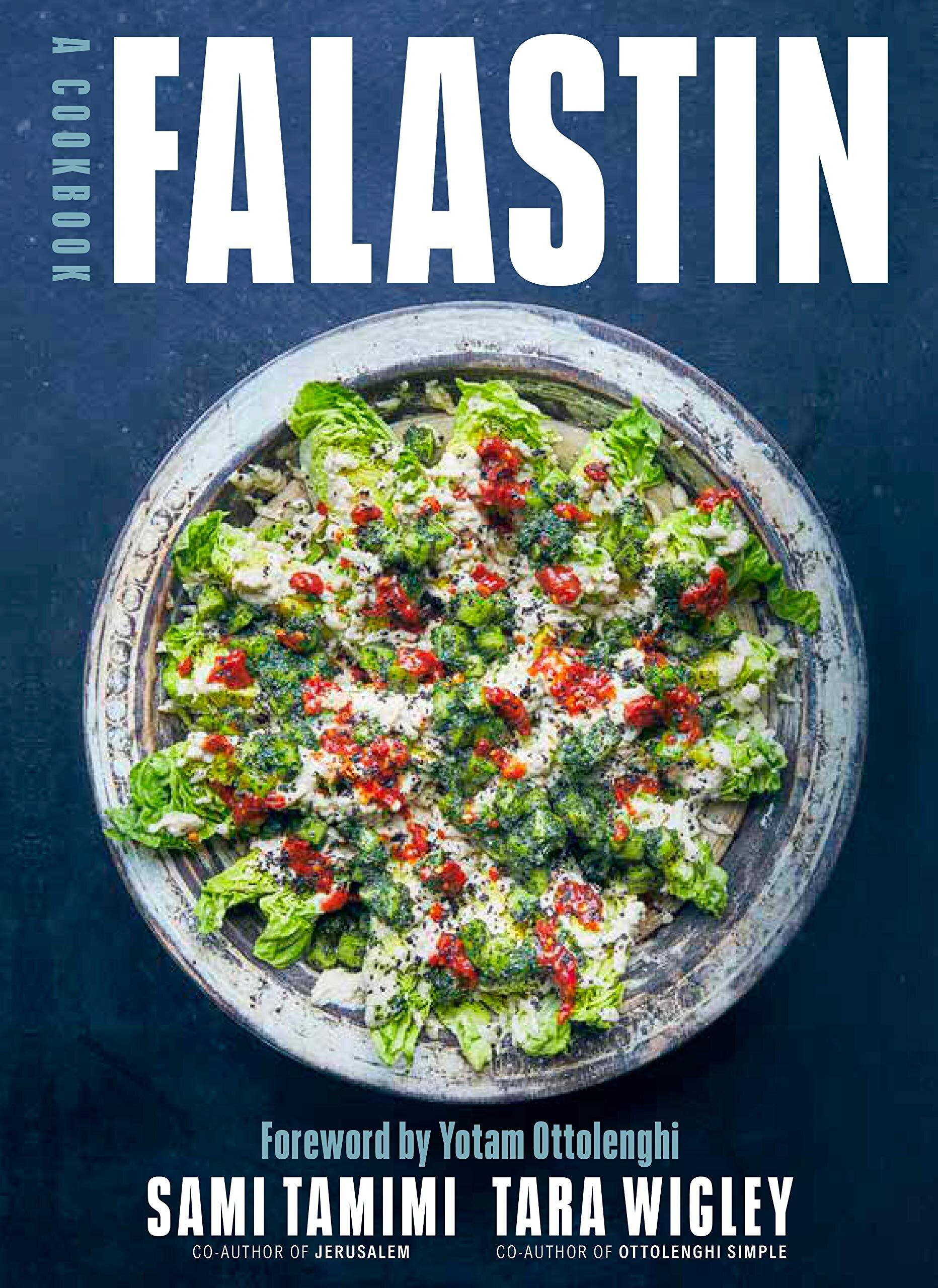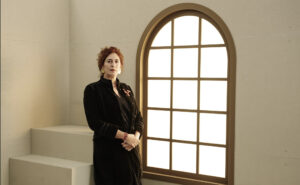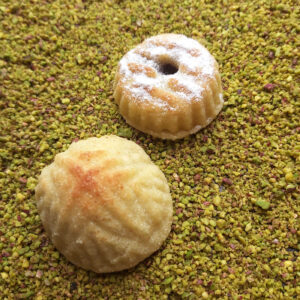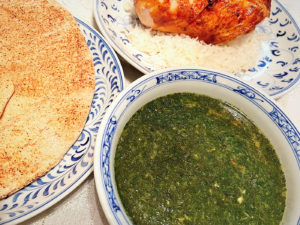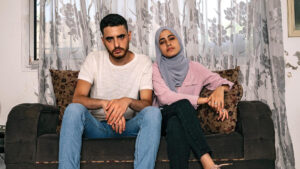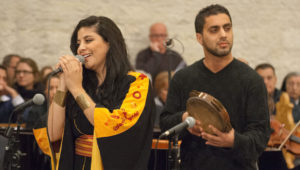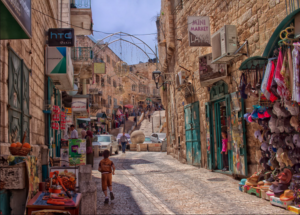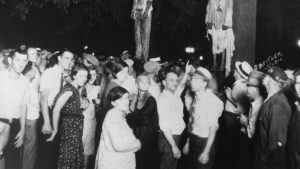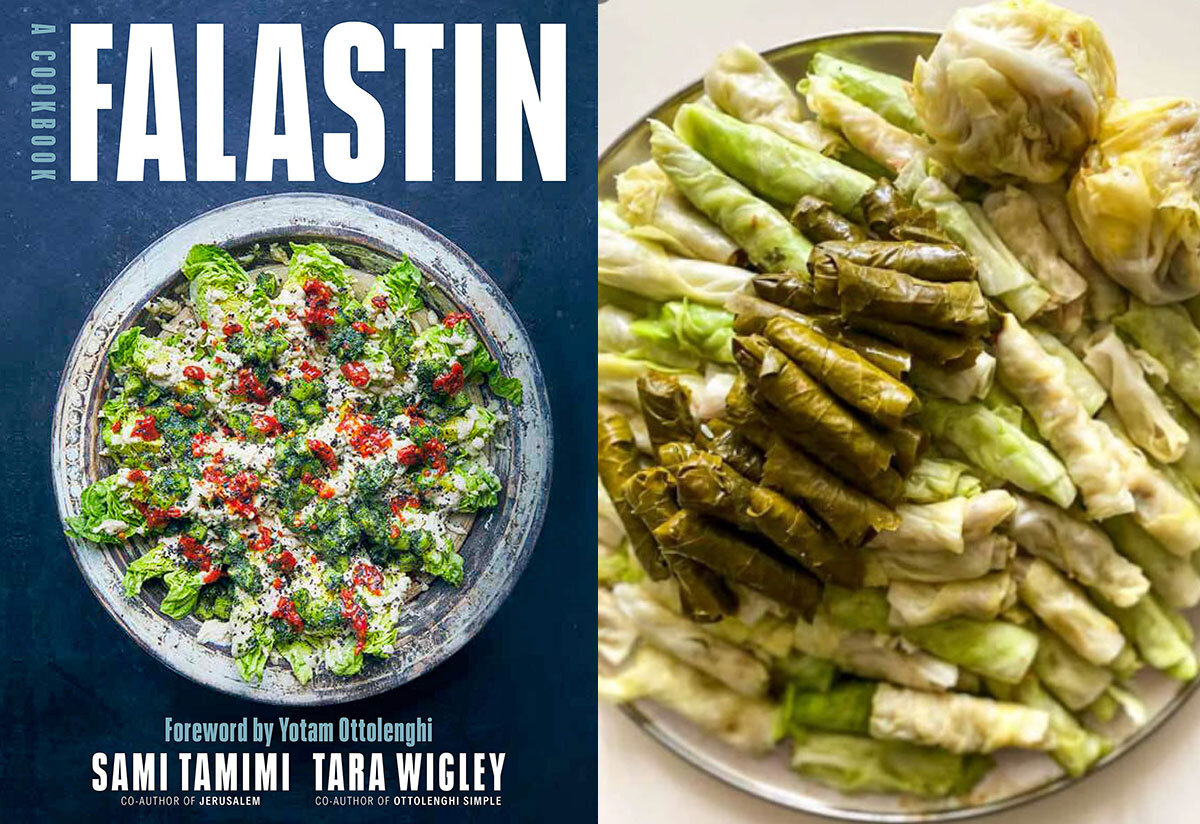
N.A. Mansour
My mother teases me from time to time, calling the way I cook “Palestinian modern.” She’s talking about the way I could take a classic dish like malfuf and exhibit a desperate need to deconstruct it, making some sort of never-before-seen rice and cabbage fry-up, something she tsks at.
When I first flipped open my copy of Falastin, the cookbook Sami Tamimi co-wrote with Tara Wigley, I saw that same experimental tendency flashing even more brilliantly in Tamimi, exemplified by the very salad that is on the cover of Falastin, a composition of lettuce and cucumber, dressed in chili paste, tahini and yoghurt. Inside the book itself, there are plays on shawarma and stuffed grape-leaves.
The day the cookbook arrived, my mother was in the kitchen and I took it over to her: my Mexican-American mother knows Palestinian cuisine better than I do and I wanted to know what she thought of this book that might very well be “Palestinian modern.” My family and neighbors taught her the way generations of Palestinian women learned how to cook, tattooing zaa’tar and sumac onto her tongue in an act of cultural heritage. When the day came and I woke up with my own tattoos suddenly running from my gums onto my wrists, my mother gave me a cabbage and reminded me when lunch was. I was still a young child and I had never made malfuf before but I had watched my mother cook. I took the sharp knife to the leaves, blanched them, and stared in wonder as fingerlike cabbage parcels of spiced-rice filled the pot. We ate them with salad and yoghurt. The last decade has seen Palestinian cookery burst onto the cookbook scene.
I enjoy holding these books, looking at the bindings and the paper. I like to think about how the way they are designed will affect how they are used, whether or not their pristine pages will soon be covered in oil splats. But Palestinian cookbooks have never really been a thing; there are Arabic manuscripts of courtly foods eaten in the imperial capitals of Damascus, Cairo and Istanbul, but little record of the everyday food of the people born outside of the ruling classes. My great-aunts find the idea laughable when I bring it up on the phone. But decades of understanding Palestinians as conflict-stricken—and blaming us for most of it—have produced a curiosity in European and American audiences: what must these people eat?
One of the first popular cookbooks documenting Palestinian food had to pay an entry toll. It took Palestinian food and wrapped it in the myth of co-existence: Jerusalem was co-written by Yotam Ottlogenhi, founder of the Ottolenghi food empire, with Tamimi, a core member of Ottolenghi’s team. Jerusalem featured some of the classics, but also had variations on dishes inspired by Jerusalem as a city. In some ways, Jerusalem was also a way to showcase the style Ottolenghi and Tamimi had built into the DNA of the Ottolenghi franchises.
More visibly Palestinian, Reem Kassis’ The Palestinian Table is a thick Phaedon edition, although it avoids mention of Palestinian political realities. Kassis’ book focuses on the classics of Palestinian cuisine and a Palestinian idyll: it’s Palestine-lite, although I don’t blame it. In the current climate, Palestinians need to be packaged in friendly boxes in order to be consumed by the average American or European reader: we have to make choices if we want to give Palestine a platform at all. Laila El-Haddad’s The Gaza Kitchen—my personal favorite—is much braver, unafraid to relay the difficult reality that Gazans live through, including access to food, as it also highlights how different Gazan cuisine is from the rest of Palestine. Nestled in the spaces between recipes are contextual notes and passages highlighting food expertise; it’s a glimpse into the Gaza I cannot touch, a Gaza which is warm and human, but kept away by Israel’s blockade. More recently, the canon of Palestinian cookbookery also includes activist-litigator Yasmin Khan’s Zeitoun, which has more of that personal angle, as it documents Khan’s time with Palestinians while researching the book. Then there is Falastin.
Similar to Haddad and Khan, Tamimi and Wigley spend much of the book highlighting Palestine, introducing us to places in Palestine, how ingredients are produced by experts, and different food initiatives in Palestine. The city of Nablus has a few pages dedicated to it and its place in Palestinian culture. Tamimi and Wigley also spend the day with a group of yoghurt-making women, as well as a Palestinian tahini maker who toes a difficult line in Jerusalem. I understand why the reflex to highlight Palestinian labor and expertise is so prevalent in Palestinian cookbooks.
A community is not built upon the individual’s belief that they can live alone and be self-sufficient. The key to surviving together is knowing who can hold your hand when and knowing they can hold yours; the link in the chain is expertise. The baklava will taste better if we buy it. Why take income away from anyone? my mother gently explained when I once asked if we could make it at home. But becoming an expert yourself is also required when you live in the Palestinian countryside. The land demands a certain level of respect: to love the land, truly, you must understand what it provides for you. And as important as community is, if you want to survive the oncoming storm, you yourself must chase down olives, wildflowers and thyme. Put them in jars. When you add them to the tahini and cheese you’ve bought from the market, they will keep and keep you alive. But there are recipes for some of these things in Falastin, my mother points out; things we would buy when we lived in Palestine, like ka’ik before school and a bag of falafel on the way home. There were vendors who would bring carts to the military checkpoint between our village and my school. There’s that pang, because for all of the access you’re denied when living in Palestine, there’s something about the bready softness of ka’ik—cut through with za’tar and salt, munched while climbing through destroyed asphalt—that I crave, minus the precarity.
Later, when we became displaced and left Palestine, we had to learn to make some of these things ourselves and adapt others. That’s why Tamimi and Wigley include the recipe sesame crusted ka’ik in Falastin because outside of Palestine, even something as everyday as ka’ik is hard to find; I can’t quite put it in my suitcase and have a store for the year, not enough at least to make me feel like I’m at home. I see the recipe and I am unsure if I will make it. I don’t have that magic in my wrists to twist dough into the elongated donut-shape ka’ik has; it won’t be the same without the oven, my mother reminds me of the importance of equipment to expertise. It would be unnatural for me to make ka’ik, I feel. But part of the ingenuity of the occupation is how it removes you from the community of experts you come to rely on. Having a recipe creates some new level of expertise. I wonder now if it would be unnatural for me not to try to make it. There are other recipes for those types of food here, mostly street food and some breads. Mana’eesh is one of the recipes here that sits between being home-cooking and street food: something my mother and aunts made at home – one aunt in particular had the oven for it– and something we picked up on a busy day of errands. It’s easy to hand a child a flatbread with za’atar and cheese spread on it, folded in half and to eat on a street corner. Knafah can be the same way. I look at Falastin’s recipe for it and I see my aunt making it in the kitchen, with me sat on a stool. But I have also eaten it as an adult on the sidewalk next to several happy older men. They might wordlessly hand me a coffee sometimes, too. So I enjoy my food best with a side of memory.
Each recipe in Falastin includes a short anecdote, sometimes about recipe development, but most of the time, they’re about Tamimi’s own relationship to the food. There’s another pang, when my mother notes how these vignettes resemble our own pasts as much as they represent Tamimi’s story: his father eats boiled eggs with za’tar. It’s the same dish we named after my beloved grandfather, Abdulkareem Eggs, equal parts boiled eggs, za’tar and mashed with a little bit of olive oil, mopped up with bread. We would have breakfast and then my grandfather would hoist me onto his shoulders and walk me through history and hills. He would pull me down for chewy melty buza on a cone. I thought of him whenever my brother and I bought ice cream years later. Tamimi has his own memories of ice cream after school. On paper, my day job is to write history and to dig through archives; it is hard not to see these little anecdotes as the documentation of one Palestinian’s memory and the hope that it adds to a growing archive of what Palestine was and what it will be. My mother asks me what I think of Falastin. I hesitate. It is difficult to write honestly about Palestine, difficult to move—with varying degrees—in digital and material spaces, Palestinian and non-Palestinian. I turn back to the index of Falastin, to the sections in between the recipes, and I am caught between praise and critique.
Like Laila El-Haddad’s work on Gaza and Gazan cuisines, Falastin understands that there is no Palestinian cuisine without politics. Ottolenghi wrote the foreword; a strategic move to have an Israeli say the word “occupation” first. The index is full of terms and history that extend beyond the culinary, acting as framing devices. There is Nabulsi cheese, as well as mashwi—the term used for barbeque in Arabic—but also “nakba” and “BDS,” terms that are known to those in the know but perhaps not to the average uninitiated reader. My brain does the mental gymnastics I do when I do research: what makes one term better than another? What does using a certain term say about your political choices? And also, how do you represent Palestine to an audience that might otherwise be hostile?
Being a historian reminds me daily that I am, like Tamimi, a child of Palestine, but perhaps of a different Palestine. I sought escape from one dimension of Palestine in another, a Palestine where I could tease olive oil out of the soil and honey came forth from my stomachs. Tamimi and I are also children of Palestine who had to leave. The magic of Palestine, in both its harshness and its generosity, never leaves you, though. When I joined a food co-op in college, I played with the ingredients I grew up with, knowing I could ask them to do what I wanted.
I produced my own dishes—”Palestinian modern”— that would etch themselves onto my tongue, brain and wrists. My mother protested when I put cumin in new places, but she was proud when I paired bulgur with seasonal New Jersey kale. While waiting for fatayer to get out of the oven to feed to 30 hungry co-op members, I would also pour over photocopies of historical documents from Jerusalem archives, a cup of tea with sage in hand. While in Jerusalem, I often ate breakfast with the archivists: onion-stuffed falafel with ka’ik from down the street. Falastin has a recipe for them. Then there are galettes in Falastin that look like mine, with beet and feta. These are not dishes inspired by Palestine. They are a dimension of Palestine, like Falastin. I will never compare to Tamimi as far as cooking, but we’re both part of a transition in Palestinian cultural heritage: there are Palestinian cookbooks for the same reason there are people like me nosing around in archives. What counts as expertise is changing in Palestine. The future is unclear and we must document what we can when we can for whoever we can.
Palestinian modern my mother warmly says of Tamimi as we close the book. I take it as a win; guess she approves of my cooking.



